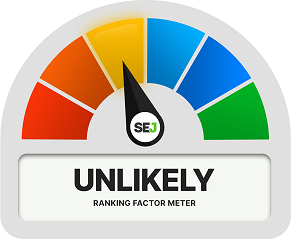Imagine you’re having a minor medical problem. Maybe every time you eat, your jaw audibly clicks behind your molars. It’s not painful, but it’s unpleasant.
To find a solution to this annoying problem, you turn to that all-purpose bank of knowledge, the internet.
As you comb through the search engine results, which source do you think is more reliable: the page written by an ear, nose, and throat doctor with ten years of medical experience or the one written by a guy who runs a Minecraft blog?
It’s an obvious choice. That’s not to say the Minecraft blogger’s page doesn’t have the correct information. Still, it’s unlikely he knows more about what’s ailing you than a healthcare professional with a medical degree, five years of residency training, and a decade of field experience.
It’s just a fact: Credibility matters. And this has never been more true than today when misinformation runs rampant on the internet.
And while most authors are genuinely trying to be helpful, there is a lot of information on the web that can be downright harmful. It doesn’t matter whether this wrong info results from maliciousness or ignorance – inaccurate or flat-out wrong content can do much damage.
That’s why author authority, or author rank, is considered in the search engine optimization process. Let’s take a look at how.
[Recommended Read:] Google Ranking Factors: Fact or Fiction
The Claim: Author Authority Influences Page Rankings
When determining the overall quality of a webpage and how well it answers a search query, Google emphasizes E-A-T. That is Expertise, Authoritativeness, and Trustworthiness.
But does this include the E-A-T of the author? Does it matter if the piece was written by a genuine expert rather than a recent journalism graduate?
Author authority is a concept that has been around for years. And the role it plays in site rankings has long been a debate between SEO experts and digital marketers.
Let’s take a closer look.
The Evidence: Author Authority And SERP Ranking
Google has never indicated that an article’s author directly influences rankings. But this doesn’t mean you can ignore it.
There is evidence that the search engine giant is interested in identifying authors.
Way back in 2005, which is an eon in SEO terms, Google filed a patent for Agent Rank. Designed to help weed out low-quality content, it allowed the search engine to use digital signatures to rank articles by reputation.
In 2011, Google confirmed support of authorship markup using rel=” author.” However, adoption of this tag was slow. A 2014 study found only 30% of authors were using this tag, and Google officially removed it the same year.
At a 2016 SMX conference, Google Webmaster Trends Analyst Gary Illyes said the company is not using authorship but has systems to recognize who created a piece of content. This seems to reference the role authors play in Google’s Knowledge Graph.
If you’re not familiar with the Knowledge Graph, it’s a massive database of facts and entities (i.e., things or concepts that are singular, unique, well-defined, and distinguishable). Authors are officially recognized entities by Google, though the search engine doesn’t know every content creator.
Author reputation matters, but be careful not to conflate “reputation” with “expertise” and “authoritativeness.”
Google uses expertise and authoritativeness to evaluate reliability on a given subject. Reputation, on the other hand, is a more subjective evaluation based on how readers view the author.
Reputation is determined according to Search Quality Raters Guidelines: a set of guiding principles used to train human raters who evaluate the search engine’s quality and sometimes test proposed changes to search algorithms.
One of these guidelines states that a low content creator score is enough to give the piece a low-quality score. However, Google has been transparent that these human-generated ratings are never used to affect query results.
In March 2020, Google filed a patent for Author Vectors, which helps it identify who created unlabeled content. It does this by evaluating writing styles and levels of expertise and interest in different topics.
While the search engine giant hasn’t been forthcoming about how or why they are using this program to determine search rankings, it has been evident in recommending the addition of author URLs in the article schema.
It does not specify what this URL should direct to, but it is most commonly used to send readers to a social media profile or bio page.
[Learn More:] The Complete Guide To Google Ranking Factors
The Verdict: Author Authority’s Impact On Rankings Is Unclear

There has been a lot of back-and-forth about author authority’s role in Google search results; unfortunately, there’s no clear answer.
However, even if it doesn’t directly impact your organic rankings, it’s still intelligent to follow Google’s Quality Rater Guidelines.
Users care about the reputation and relevance of a piece’s author. And this alone is reason enough to seek out the best possible authors and identify them in each article.
Featured Image: Paulo Bobita/Search Engine Journal




